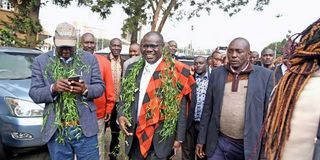Sunkuli: My encounter with Sierra Leone rebel leader Foday Sankoh

Former Internal Security minister Julius Sunkuli (centre) in Nairobi on July 31, 2018. He led the Kenyan delegation to Sierra Leone in 2000. PHOTO | FILE
What you need to know:
- President Moi had tasked Mr Sunkuli to lead a mission to Sierra Leone to help in securing the release of the Kenyan soldiers captured by the Revolutionary United Front , headed by Corporal Sankoh.
The Kenyans soldiers were part of the UN Mission in Sierra Leone (UNAMSIL) mandated to primarily protect civilians under imminent threat of violence in the country’s civil war.
“So you now think that I am important?”
This is the first question that Sierra Leone rebel leader Foday Sankoh asked before breaking into a deep laughter that lasted for about a minute.
Speaking 20 years after leading a high-level delegation to secure the release of kidnapped Kenyan peacekeepers in the war-torn Sierra Leone, former National Security minister Julius Sunkuli vividly remembers the sarcastic tone of the rebel leader in an interview with the Sunday Nation.
“I had just informed him that President Daniel Moi had sent his greetings then he (Sankoh) bursts out laughing,” Mr Sunkuli recalls.
President Moi had tasked Mr Sunkuli to lead a high-level mission to Sierra Leone to help in securing the release of the Kenyan soldiers captured by the Revolutionary United Front (RUF), headed by Corporal Sankoh.
During the fighting, four Kenyan soldiers were killed and several other UN peacekeepers abducted.
The deceased Kenyan soldiers were Corporal Jeremiah Obuya, Corporal Evans Kamande, Private Robert Wanyama and Private Khamis Yunis.
Released from captivity
Those captured included Brigadier James Mulinge, UNAMSIL Sector East Commander, who refused to be freed until the last of his men were released from captivity.
The Kenyans soldiers were part of the UN Mission in Sierra Leone (UNAMSIL) mandated to primarily protect civilians under imminent threat of violence in the country’s civil war.
Mr Sunkuli’s delegation was composed of members of the parliamentary Committee for defence and foreign relations namely Dr Mukhisa Kitui, Paul Kihara, Odeny Ngure, Samwel Poghisho and David Musila.
Lt Gen Opande was co-opted in the delegation as the representative of the then military chief General Daudi Tonje.
This week, both Mr Sunkuli and Lt Gen (Rtd) Opande recalled the tricky mission in its 20th anniversary.
“It was a very tough assignment in which everything could have gone wrong,” the retired general said.
The two men, Corporal Sankoh and former Liberian President Charles Taylor, who held the key to the freedom of the Kenyan troops smiled freely as they chopped the hands and heads of their victims.
By the time the civil war in Sierra Leone was ending in 2006, it had become one of the worst conflicts in the world.
Chopping of limbs
The atrocities committed included the chopping of limbs and beheading of civilians, whose heads were often displayed at checkpoints.
In April 2012, Taylor was jailed for 50 years after being found guilty of aiding Sierra Leone war crimes. “It is these men that we were sent to negotiate with,” Sunkuli says.
The former Minister said that they first met Taylor in Monrovia and requested him to speak to Sankoh as they knew that he exercised influence over the RUF.
Then they later on met with Sierra Leone President Alhaji Kabbah before meeting Sankoh, who was being held at Pademba Road Prison in a dark and windowless cell. “He had not been allowed to exercise for several weeks and had a bandage around his leg where he had been hit by a bullet during his arrest that caused a flesh wound,” Lt Gen (Rtd) Opande writes in his autobiography, In Pursuit of Peace in Africa.
They also met Johnny Paul Koroma, another rebel leader, who briefly became the president of Sierra Leone.
“Within about one-and-half weeks of negotiations, we were able to rescue of soldiers,” Sunkuli recalls.
The civil war in Sierra Leone broke out in March 1991, when the RUF led by Sankoh, invaded Sierra Leone from Liberia, triggering a civil war.
In his heydays, Sankoh was so violent and powerful that no one else could dare to refer to himself using the title Corporal.
Kenya sent a battalion-size force comprising of four infantry companies, Support Company, Headquarters Company and battalion headquarters, under the command of Lieutenant Colonel Musumbu as Commanding Officer (CO).
The team, which was under the command of Brigadier Mulinge was, however ambushed, resulting in the capture of 400 UN peacekeepers.
The RUF were supported by Liberia’s President Charles Taylor, and were rebelling against the then President Joseph Momoh who had been in power since 1967.





